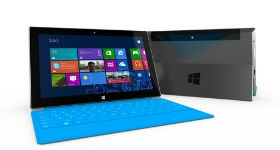There's been grumblings and speculation that Microsoft's move into hardware is a major faux pas, annoying its OEM partners, specifically, HP, Dell and Lenovo. To which I say, "Really?" If the remaining PC hardware vendors are annoyed, they have no one but themselves to blame, especially if Microsoft takes a plunge into server hardware in the future.
The Surface line of hardware, starting with tablets and now moving to a lightweight laptop, seems to be the envy of many (non-Apple fanboy) tech writers. The Book matches up with the MacBook Pro series quite nicely. Demand for the new laptop is booming, judging by pre-sales ordering and potential buyers (like myself) are going to have to balance off purchasing a Surface Pro 4 vs. a Surface Book.
What has stopped OEMs from making a Surface Book or even a MacBook Pro-like offering? Of the three companies listed as being disgruntled, HP has been busy putting out fires and trying to divorce its PC hardware business from its enterprise services. The company has made some half-hearted attempts at 2-in-1s with removable screens that perform as tablets, but the engineering has been clunky. Dell is more worried about building a big company than design, having made a megabid for EMC. One wonders what the company could have come up with had it spent a couple more bucks on innovative design than lawyers studying M&A options.
Lenovo is the most interesting of the three. One could argue that it has pushed the envelope with its Yoga line of 2-in-1 laptops, both in terms of functionality and form factor. If you want a bigger and thinner in a laptop, Lenovo has to be considered the leader. The Yoga 3 series is edging towards MacBook Air thinness and weight while rolling in a USB-C-port that Microsoft forgot to put into its latest Surface products. On the downside, Lenovo is loading up a bunch of software few people want to deal with.
 Image via Shutterstock
Image via Shutterstock
By diving into the laptop hardware market, Microsoft -- like Google making Nexus phones – demonstrates the art of the possible. HP and Dell have become complacent, like Detroit auto makers once upon a time, riding on past laurels without pushing the envelope of styling and features. Unlike Detroit, its Asian competitors (with the exception of Lenovo) didn't bring much extra to the table, preferring to compete on a balance of price and "Good enough" features.
Will Microsoft bring servers to the table in the future? There are points both positive and negative to the possibility. Microsoft is already building its own customized server hardware to support its Azure data centers and supports Linux, as well as has its own version of Linux running on its network hardware. One in four instances running on its cloud is Linux and the company is a big (abet late) convert to open source.
The downside to Microsoft offering a hardware server is that compute tasks would not run on the Azure cloud, putting it against the whole "Mobile first/cloud first" mantra as well as the more general principle that steady monthly recurring revenue beats one-time hardware sales in the cloud world. Is it truly possible? Microsoft's Surface Pro was supposed to be tablet to replace the laptop -- followed by the Surface Book laptop. I wouldn't bet against a lean and mean Microsoft server for enterprise use in the future if OEMs don't step up their game.
Edited by
Kyle Piscioniere